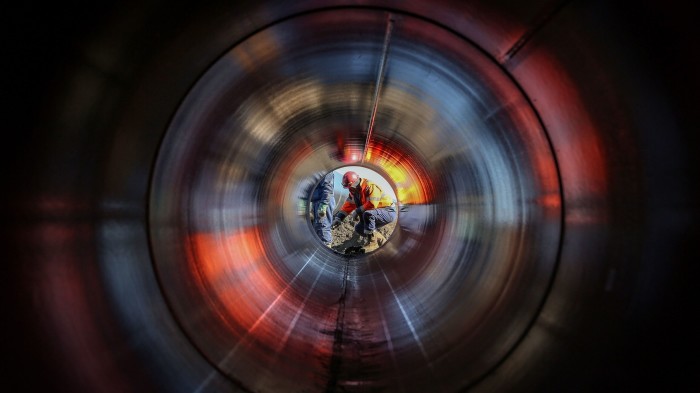Good morning. News to start: Brussels is reassessing its investigations into big tech companies amid fierce lobbying over digital regulation. The review — rather than a suspension of the probes — is pegged to the new five-year European Commission, but comes as tech CEOs call for US president-elect Donald Trump to push back against EU enforcement.
Today, our energy team reports on market fears that the last working Russian gas link to Europe could be affected by the war in Ukraine, and our Rome bureau explains why Italians are turning away from e-scooters.
Last link
Ukrainian drones have allegedly targeted the Russian section of the last remaining pipeline feeding the Kremlin’s gas into the EU, in a reported development that pushed up market prices by more than 7 per cent, write Alice Hancock, Anastasia Stognei and Shotaro Tani.
Context: The TurkStream pipeline going via Turkey feeds countries in central Europe and the Balkans, notably Hungary — the only EU country that has maintained significant contracts for Russian gas following Moscow’s full-scale invasion of Ukraine. It is the only route to Europe left, after flows of Russian gas through Ukraine stopped two weeks ago.
Yesterday, Russia’s defence ministry claimed that Ukraine on Saturday attempted to attack a compressor station in Russia’s south-west Krasnodar region which feeds gas into the pipeline, using nine drones. All drones were intercepted and destroyed, the ministry said.
Ukraine did not comment on the incident or confirm that it took place.
The announcement pushed gas prices up 7.2 per cent by the end of yesterday. The surge occurred despite the station continuing to supply gas to the TurkStream pipeline as normal, according to the Russian ministry.
The Kremlin dubbed the “attempted attack” as “a continuation of Kyiv’s policy of energy terrorism”. Speaking to reporters yesterday, the Kremlin’s spokesperson Dmitry Peskov equated it to “a series of actions involving explosions, sabotage, and the organisation of bombings”.
The disruption comes at a sensitive time for Europe’s energy markets, as Brussels makes overtures to the incoming US administration for increased purchases of American LNG, partly in order to appease Donald Trump and avoid his threatened trade tariffs.
According to Peskov, the Kremlin views the US as the main beneficiary of the further reduction of Russian gas flows to Europe, alleging that it has “increased LNG supplies to Europe at inflated prices”.
Moscow curbed pipeline gas supplies to the EU after its full-scale invasion of Ukraine in 2022, causing a price spike and prompting the bloc to wean itself off the supply.
Hungary is the EU’s last major holdout for Russian pipeline gas. Hungary’s foreign minister Péter Szijjártó wrote on Facebook that “any action threatening our energy supply must be seen as an attack on sovereignty”.
Contrary to the bloc’s target of importing no Russian fossil fuels by 2027, Budapest has a long-term contract dating from 2021 for 4.5 billion cubic metres of Russian gas per year, which Szijjártó announced in October it would increase by more than 2 bcm.
Chart du jour: Tables turned
Germany used to be the motor of the European economy, with France not far behind. But in a dramatic reversal, growth is now being driven by the once-ailing south.
Slowdown
Rentals of e-scooters have plunged by 30 per cent after Italy implemented stricter rules to curb reckless driving, write Giuliana Ricozzi and Amy Kazmin.
Context: Italy has put the brakes on electric scooters which are turning the streets into a “jungle”, according to the government. Since mid-December, riders have to wear a helmet and carry third-party liability insurance to rent the scooters.
There are about 55,000 scooters available across Italian cities, but vehicles left abandoned on pavements have drawn the ire of residents, especially in touristic places. Other European cities such as Brussels have implemented speed limits and dedicated parking zones to rein in the trottinettes, while Paris has banned them altogether.
Italy’s new rules, part of a new road code, were set to limit irresponsible conduct and reduce accidents involving e-scooters, but operators warned they would drive up costs and crush demand. One month since the ban came into force, their worst fears seem to have materialised.
In the last month, rentals decreased by 30 per cent compared with the same period last year, and sales have fallen between 30 and 50 per cent, according to the Alliance for Sustainable Mobility, an association representing operators including Bird, Dott and Lime.
‘’The impact of the new regulation would lead to a reduction in the sector’s turnover of almost 300 million euros’’ in the next five years, the Alliance wrote in a statement.
The association also warned of repercussions on employment, saying that the drop in e-scooters rentals could cause the loss of 1,200 jobs in Italy.
What to watch today
-
Nato countries bordering the Baltic Sea hold a leaders’ summit in Helsinki.
Now read these
Read the full article here

